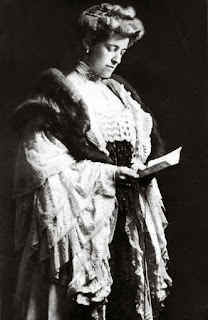 |
| My paperback of The Age of Innocence, by Edith Wharton. First published in 1920, this edition published in 2004. (Photo by Mark C. Taylor) |
 |
| Edith Wharton, 1862-1937 |
Edith Wharton’s 1920 novel The Age of Innocence looked back at the Gilded Age of the 1870’s in New York City society. It was a world that Wharton knew very well—born Edith Jones, her family was supposedly the inspiration for the phrase “keeping up with the Joneses.”
The novel opens with main character Newland Archer attending the opera, and Wharton makes it clear that there’s just as much action happening in the boxes of the wealthy as there is on the stage. The Age of Innocence follows Newland as he courts the beautiful but conventional May Welland. Newland is tempted by his attraction to Ellen Olenska, May’s cousin who married a Russian count and returned to New York when her marriage collapsed.
The Age of Innocence is a study of how an individual interacts with the society around him. Newland has a desire to break free of the strict role that society expects him to play. There’s a marvelous moment when Newland suggests to May that they elope. She tells him, “We can’t behave like people in novels, though, can we?” (p.70) Of course, the irony is that they are people in novels, although they both feel a strong pull to act within the conventions of upper-class society.
Another theme of the novel is the role of women in society. Wharton knew from her own life experience how limited women’s options were in upper-class society. Thankfully for literature lovers, Wharton was able to break free and enjoy a fantastically successful career as an author.
Wharton writes of men understanding “the abysmal distinction between the woman one loved and respected and those one enjoyed—and pitied.” (p.80) Wharton underscores society’s role in determining these roles for women: “All the elderly ladies whom Archer knew regarded any woman who loved imprudently as necessarily unscrupulous and designing, and mere simple-minded man as powerless in her clutches.” (p.81)
At his wedding, Archer muses on the customs of his society, as there was debate as to whether or not the wedding gifts should be “shown”: “It seemed inconceivable to Archer that grown-up people should work themselves into a state of agitation over such trifles…Yet there was a time when Archer had had definite and rather aggressive opinions on all such problems, and when everything concerning the manners and customs of his little tribe had seemed to him fraught with worldwide significance.” (p.149)
Wharton’s sharp irony and sense of humor is on full display throughout the novel. One of my favorite lines was Newland’s response to his mother-in-law querying him as to how he intended to spend the afternoon: “Oh, I think for a change I’ll just save it instead of spending it—” (p.181)
Another humorous moment is Wharton’s explanation of why Archer has taken to reading history in the evenings rather than poetry. If May sees him reading poetry, she inevitably asks him to read it aloud. “In the days of their engagement she had simply (as he now perceived) echoed what he told her; but since he had ceased to provide her with opinions she had begun to hazard her own, with results destructive to his enjoyment of the works commented on.” (p.239-40)
There is heartbreak and pain as well, as the romantic Newland clashes with the demands of the pragmatic society around him. As he says to Ellen, “I want somehow to get away with you into a world…where we shall be simply two human beings who love each other, who are the whole of life to each other; and nothing else on earth will matter.” Ellen responds, “Oh, my dear—where is that country? Have you ever been there?” (p.235)
Edith Wharton is one of my favorite authors, and The Age of Innocence is a masterful novel—it is at once a detailed portrait of a specific time and place, and it also transcends that specific time and place to continue to speak to readers now, more than a century after it was first published.
No comments:
Post a Comment